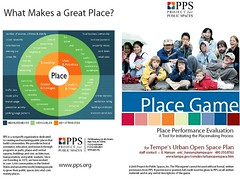Obvious candidates for neighborhood planning exercises
DC has announced that 23 schools will be closed. Last week, a first round of community meetings were held. Next week starts a second round. See "Community Meetings to Discuss new Uses for Excess School Space" from the Office of Planning website.
Clearly, it's obvious that this is a process that isn't being run by the Office of Planning (at least I hope so) because then it would be done much differently--with a planning process. I don't see how these issues can be covered for multiple schools in two meetings each of two hour duration.
The way to do it would be to do a neighborhood planning exercise for every school.
In fact, I suggested this about 3 years ago, using the PPS "How to Turn A Place Around" "place game process" for JO Wilson Elementary in Ward 6, in part as a way to reconnect the school to the community that doesn't have children, to get residents on the perimeter of the school grounds to take more interest and provide "eyes on the street" to protect the school when closed, to have community center aspects beyond strictly school functions, to treat the playground in part like a community park, since there is no park north of Stanton Park, and south of Gallaudet, other than school grounds, in this neighborhood, as well as to improve the school...
You know that I love the PPS method, because it spends upfront time on placemaking principles, best practices, etc., before unleashing the participants out on the world.
The PPS place game process workshop design is what should be employed if you really want to have a high quality, deliberative, civic engagement, neighborhood planning process for dealing with about-to-be-closed schools.
Here's an article about the placemaking workshop experience from Canada, "Seminar And Workshop On Placemaking Major Success: Civic Admin Project Could Move Ahead With Changes."
Tempe Arizona's public and open space planning process was run by PPS, using the placemaking approach. The project, including the final plan, is documented here. (Of course, this was a much more involved process than would be planning around a neighborhood school, or even creating a neighborhood plan, because it encompassed the entire city.)

Labels: civic engagement, education, neighborhood planning, urban design/placemaking



0 Comments:
Post a Comment
<< Home